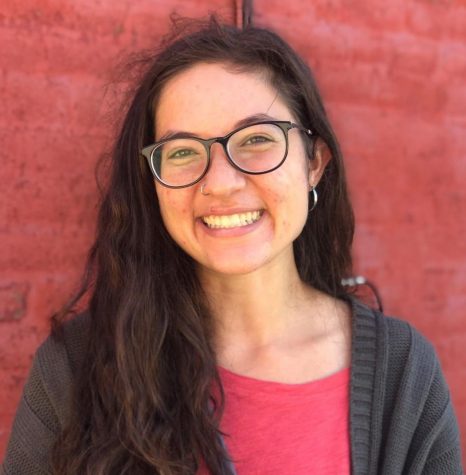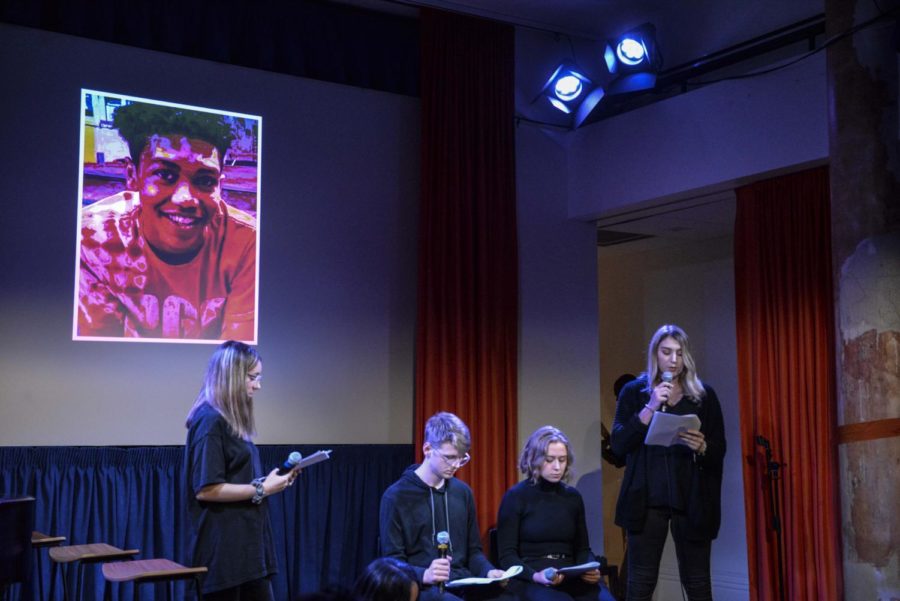The Outbreak | Coronavirus is separating me from my classmates in prison
The Outbreak is a new blog describing the different ways the coronavirus pandemic affects our lives. Today, opinions editor Leah Mensch writes about the end of her class sessions in a Pennsylvania prison.
Brian Gentry | Contributing Writer
Pitt students read poetry written by “inside students” as part of an inside-out class run within the SCI Somerset prison in the fall semester.
For the most part, Pitt classes going online for COVID-19 precaution has been manageable.
In my writing capstone, it means that we have to video chat. In the discussion-based class for which I’m a UTA, it means we have to workshop essays via Google Docs, rather than face to face. None of this has been ideal, but together we’re making it work. Remote classwork was the right choice, the responsible choice, but some of the effects of remote teaching have been harder to bear than the others. In my autobiography writing course, Pitt going online means that I’m losing complete contact with half of my classmates.
Each Wednesday for the first half of the semester, half of my class traveled from Pitt to the SCI Somerset prison an hour east of Pittsburgh to meet up with the other half of our class — incarcerated men who, like the students traveling from campus, were also enrolled in the autobiography course. In our classroom inside the prison, we read and discussed pieces of autobiography. We shared pieces of our own autobiographies with each other.
The list of things Pitt students like me — or outside students — weren’t allowed to bring inside was far longer than things we could. The prison provided pens and notepads for all students. My professor scanned the outside students’ essays and reading journals days prior to class and the prison printed them out and stacked the papers in the classroom when we arrived. Sometimes the papers didn’t print. Sometimes only half of the students had discussion material at all. It wasn’t perfect, and most of the time, it wasn’t even ideal, but together, we made it work.
But now Pitt is online, and for my inside classmates — my incarcerated classmates — video chatting with outside classmates isn’t an option. Providing feedback on work remotely isn’t an option. As per the rules of Inside-Out — the program which Pitt works alongside to make this partnership possible — outside students are not allowed to contact the inside students, and vice versa, during the program or after the program. This means no visits, no letters to classmates whose stories we’ve spent many months reading, knowing. All of us — inside and outside students alike — are losing half of our classmates.
[More about other Inside-Out classes at Pitt]
So long as it’s permitted, my professor plans to find a way to finish working at Somerset, teaching my inside classmates, even if this happens after the semester ends. Along with my outside classmates, I’ll continue writing and reading autobiography remotely. But so much of what each of us have learned this semester has come from being together, in a singular room. We no longer have the ability to share our work with each other face to face.
Sharing my writing and reading my classmates’ writing has always been about evoking a sense of empathy and community within a group. But in this autobiography course, it’s been more than just that. It’s been about feeling seen by my classmates — inside and outside — through sharing my work, my personal story. It’s been about helping my other classmates — inside and outside — feel seen as we talk about their work, their stories. It’s been, in many ways, about crossing various borders.
My classmates and I read a lot about borders this past semester. We read James Baldwin and Ocean Vuong and discussed their metaphorical borders — race, social class and family. We also discussed literal borders, reading autobiography from writers like Valeria Luiselli, who is a Spanish translator for child refugees attempting to cross the southern U.S. border. “There are borders everywhere,” one of my classmates said one day. Then came the silent nods, in agreement.
I’ve been thinking about this for many weeks now, the idea of borders being all around us. Being left without half my classmates in wake of the pandemic, I am thinking about it now, especially.
There are obvious borders between my inside and outside classmates. You don’t need me to tell you about those. But I’ve realized that there are just as many borders — though perhaps less obvious — between myself and other outside students. It’s true that this class was inside prison, that half of my classmates were incarcerated. But also, this class was inside of a classroom. And all of my classmates were truly classmates. All of my classmates were writers. All of my classmates showed up for each other week after week and tried deeply to understand each other. We tried so hard.
In one way or another, this class was difficult for every student. Maybe not in the same way, but nevertheless, we all struggled. But both consciously and subconsciously, we helped each other through. So, mostly this class has been about, still is about, learning to show up for each other despite the borders around us — the physical and the metaphorical, the visible and the invisible. It’s been about trying to cross these borders. Trying to, at least, see over them.
All of my outside classmates and I are collaborating with each other, trying to find ways to continue working together with the inside students for the remainder of the semester. Each outside student is going to write a piece of autobiography that somehow concerns our time spent inside the prison, or the experience of taking the course, perhaps. And this way — while we won’t be able to hear the voices of our inside classmates or collaborate and learn alongside each other — inside classmates will still be with the outside classmate in sprit. My inside classmates will be teaching the outside classmates like me, helping me to write.
Going forward isn’t going to be ideal. It’s going to be messy. But if I’ve learned one thing from my professor and all of my classmates in this course, it is this: there are many, many different ways to show up for one another.

Leah Mensch (they/she) is the opinions editor at The Pitt News. A Pittsburgh native, they will graduate in 2021 with degrees in Nonfiction Writing and...


